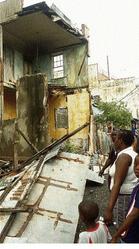
Eulalee Thompson Many people in my age cohort had looked forward to the arrival of Hurricane Gilbert, with great expectations, on what turned out to be a fateful day, September 12, 1988. Up until then, we had only heard tales of the things that a really ferocious hurricane could do - the uncontrolled winds, torrential rainfall and destruction.
Great expectations soon turned sour when all our 'creature comforts' were taken away. 'Gilbert's' wrath and dislocation taught us a new respect for the power of nature and since then our 'disaster survival quotient' has reached new levels with our experiences of Hurricane Ivanin 2004 and now 'Dean'.
At an individual and national level, we are now just rolling with the 'hurricane punches', disaster plans are in place and post-disaster recovery strategies are in place and working (I even had my piped water restored 7.30 Monday morning, just a few hours after the monster Hurricane Dean).
Post-disaster stress
However, for many people, a natural disaster such as a hurricane can cause real stress and anxiety. For example, two local studies (Thompson & Abel, 2004), carried out shortly after Hurricane Ivan in 2004, indicated that close to 40 per cent of a sample of tertiary-level students reported between one and eight criteria associated with posttraumatic stress disorder (PTSD) following their hurricane experience.
The study also found that those people who experienced loss of property, injury or death and those who felt anxious, worried or fearful during the passage of the hurricane were more likely to report PTSD and anxiety symptoms.
The lesson is that a disaster such as a hurricane can be a traumatic experience for many of us and besides taking care of people's physical needs after a disaster, psychosocial support should be provided for those who lose "their life's investment" in a hurricane.
Manage the stress
The Jamaica Red Cross (JRC) offers some tips on how to identify and manage post-hurricane stress. Look out for change in sleep pattern; feelings of hopelessness, sadness or crying easily; complaints of headaches and bellyaches and a changing pattern in drug and alcohol use.
To manage the post-disaster stress, the JRC advises you to do something fun; do some exercises; listen to music; eat well and lean on your faith.
Strategies for children
Children need special attention to cope with disasters, so encourage them to ask questions about what is happening and about their feelings; then be honest in your responses, tell them exactly what has happened. If, for example, someone has died, don't say that the individual "has gone to sleep", the child may become fearful of going to sleep. Do, however, assist children to focus on the positive events in the disaster, for example, people's caring and sharing.
eulalee.thompson@gleanerjm.com

These residents of East Street, downtown Kingston, look at the damage that was done to their fence and home on Monday.

A resident of Allman Town in Kingston cleans her house in the aftermath of Hurricane Dean. - photos by Rudolph Brown/Chief Photographer

